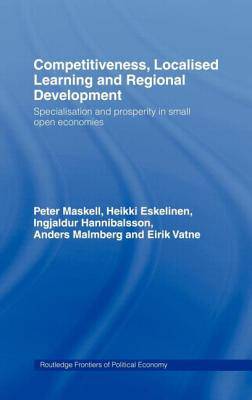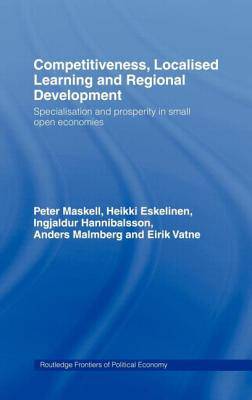
- Afhalen na 1 uur in een winkel met voorraad
- Gratis thuislevering in België vanaf € 30
- Ruim aanbod met 7 miljoen producten
- Afhalen na 1 uur in een winkel met voorraad
- Gratis thuislevering in België vanaf € 30
- Ruim aanbod met 7 miljoen producten
Zoeken
Competitiveness, Localised Learning and Regional Development
Specialization and Prosperity in Small Open Economies
Heikki Eskelinen, Ingjaldur Hannibalsson, Anders Malmberg, Peter Maskell, Eirik Vatne
€ 305,45
+ 610 punten
Omschrijving
Drawing on a rich literature and case study material from selected industries, and elaborating on key concepts such as firms and competencies, industries and industrial systems, and competitiveness and prosperity, this book sets out to answer three broad research questions: * What is competition about in today's economy? * Why do geographical areas (local milieus, cities, regions, countries) specialize in particular types of economic activity, and why do patterns of specialization, once in place tend to be so tremendously durable? * How can high-cost regions in general and small industrialized countries in particular sustain competitiveness and prosperity in an increasingly globally integrated world economy? This book points the way out of a dilemma created by recent industrial theory and policy: is it possible for countries which are not destined to be leading high-tech powers to take advantage of the current conjuncture of increasingly open-markets.
Specificaties
Betrokkenen
- Auteur(s):
- Uitgeverij:
Inhoud
- Aantal bladzijden:
- 272
- Taal:
- Engels
- Reeks:
Eigenschappen
- Productcode (EAN):
- 9780415154284
- Verschijningsdatum:
- 25/12/1997
- Uitvoering:
- Hardcover
- Formaat:
- Genaaid
- Afmetingen:
- 163 mm x 241 mm
- Gewicht:
- 539 g

Alleen bij Standaard Boekhandel
+ 610 punten op je klantenkaart van Standaard Boekhandel
Beoordelingen
We publiceren alleen reviews die voldoen aan de voorwaarden voor reviews. Bekijk onze voorwaarden voor reviews.











